Training a puppy is an exciting yet challenging journey, and having the right equipment can make a world of difference. Selecting the best lead for your puppy is crucial for effective training and ensuring your furry friend's safety and comfort.
Whether you're teaching basic obedience, social skills, or how to walk properly on a lead, the correct leadis foundational to your success. In this guide, we'll explore how to choose the best lead for puppy training, covering various types, materials and additional features to consider.
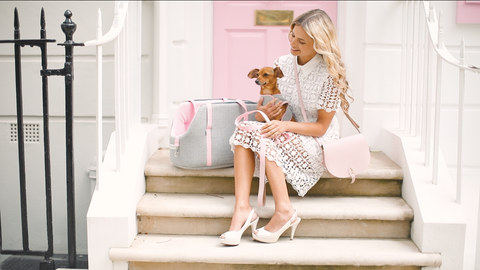
1. Understanding the Importance of the Right Lead
A well-chosen lead serves as a crucial link between you and your puppy, enabling you to guide, rectify, and comfort them throughout the learning process. This choice is instrumental in setting boundaries and instilling appropriate behaviour across varied settings. An ideal lead strikes a harmonious balance, offering ample control for you as their trainer, whilst ensuring the puppy's comfort, thereby laying the groundwork for a rewarding and positive training journey for you both.
2. Types of Leads Suitable for Puppy Training
Amongst a huge selection, standard leads often range from about 1.2-1.8 metres, provide a balanced mix of control and freedom, essential for reinforcing obedience and good behaviour. Retractable leads, although offering variability in length, can sometimes compromise on the degree of control required during foundational training sessions.
Opting for either a standard or adjustable lead is generally recommended, as these types facilitate a constructive training environment by enabling precise guidance while affording puppies the liberty to explore within safe bounds.
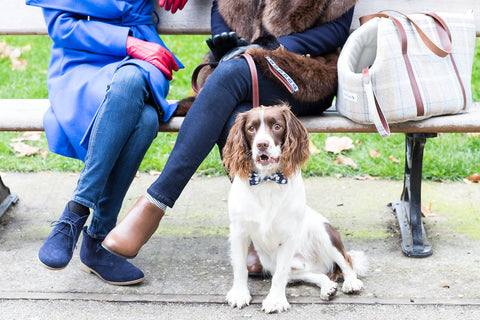
3. Material Matters - What's Best for Puppies
The selection of the lead's material is an important factor in ensuring both durability and comfort during puppy training. Nylon or polyprop webbing, leather and rope are the most common choices, each offering unique advantages.
Webbing is celebrated for its resilience and variety in design, though it may feel somewhat abrasive with vigorous pullers. Leather, on the other hand, is renowned for its robustness and the way it gracefully ages, becoming softer and more pliable over time, thereby enhancing comfort for both handler and puppy alike. Rope leads, whilst practical for specific training scenarios, demand a cautious approach to prevent any potential discomfort for dogs who like to pull.
Our Sand Sheltie and Pink Sheltie leads are made from the highest quality bridle leather and soften beautifully over time and feel great to hold. You can check out our styles here. We've also combined the best of both worlds in our webbing and leather dog leads, for practicality and style.
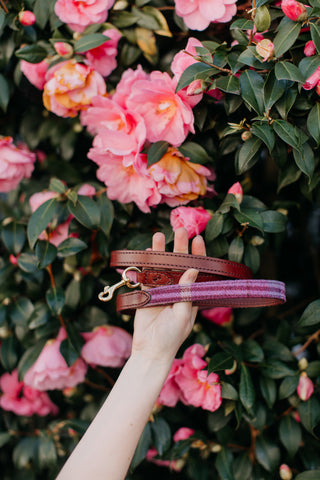
4. Length and Width - Finding the Perfect Balance
Determining the optimal dimensions for a lead is pivotal in marrying the needs of both safety and exploration. You want enough length to afford your puppy sufficient leeway to investigate their surroundings whilst remaining within the your sphere of influence. The breadth of the lead, conversely, should align with the puppy's physique and vigour. For smaller breeds, a slimmer lead will suffice, reducing the burden and enhancing manageability - we offer our webbing leads in a slim and wide version. In contrast, more robust leads are advisable for larger breeds, ensuring you can retains adequate control without compromising on the lead's integrity.
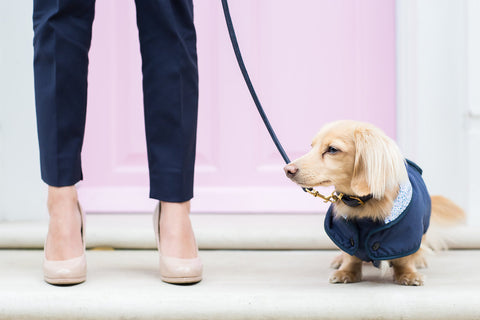
5. Tips for Using the Lead Effectively
Introducing your puppy to their new lead should be done in a calm and encouraging environment, allowing them to become comfortable with its presence. When you begin training, keep your hold on the lead gentle yet firm, guiding your puppy with steady, consistent movements. It's crucial to reward your puppy's compliance and positive actions whilst on the lead with treats and verbal praise, reinforcing good behaviour.
Remember, patience and consistency are key; mastering lead training is a gradual process that requires regular practice and understanding. Avoid becoming disheartened by setbacks, and celebrate the small victories as your puppy learns to walk confidently by your side. Enjoy this time together and remember to take lots of photos of these precious moments - they go quickly!
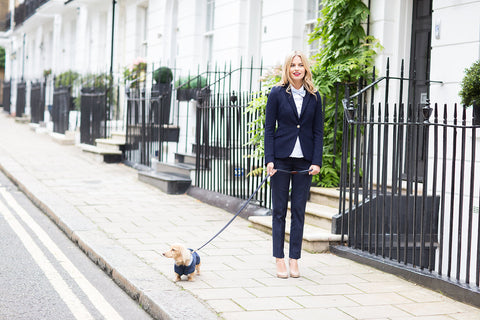
Warmest woofs,
Holly & Teddy xxx





Leave a comment (all fields required)